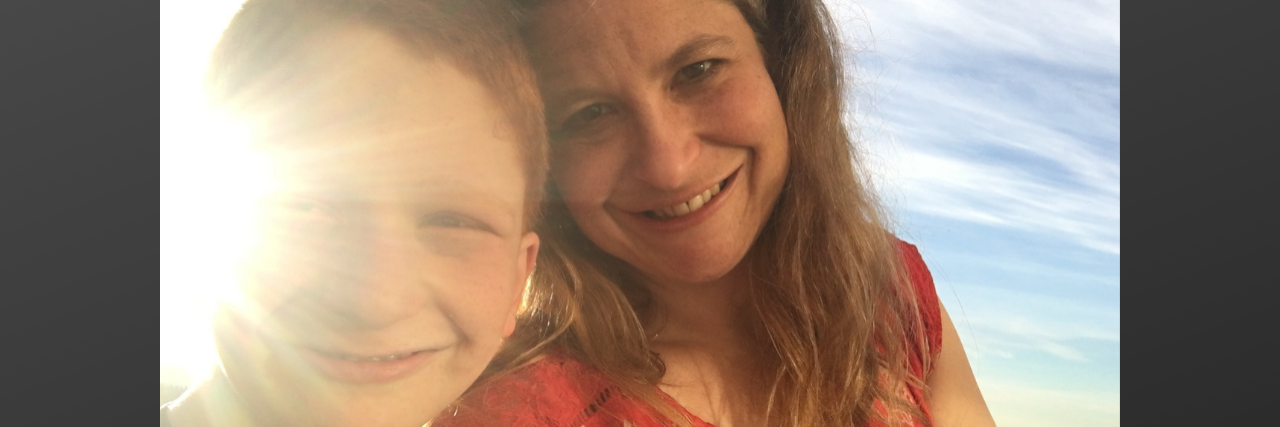My Son Was Diagnosed With Autism at 13 Years Old
Editor's Note
This story has been published with permission from the author’s son.
Last April, in a moment of impulsive mischief, Nate swallowed a button battery at school. He ended up in the emergency room.
The bad news was that an x-ray proved there was absolutely a battery in his digestive tract. The good news was that a follow-up x-ray a few days later proved the battery had left the building, and Nate sustained no internal injuries. The best news of all was that Nate’s actions got the attention of the grownups around him, and an urgent referral was made to a clinic specializing in “challenging” behaviors.
Over the next six months, with a singular focus, I filled out paperwork, scheduled appointments, did parent-intake meetings, filled out more paperwork, ushered Nate through hours of assessments, and filled out more paperwork. I got us on waiting lists, I argued with insurance companies, I filled out more paperwork and I made more phone calls. I dabbled in mindfulness meditation, tried to control my emotional eating, and did a lot of waiting. The battery was swallowed in April, but it was early September when Nate finally made it to the top of a wait list and met with a private behavioral specialist for the first time.
Showcasing Nate’s behaviors to a beautifully dressed stranger furiously jotting down notes in my living room felt a little like the nightmare you have when you walk into a crowded room and realize you have no pants on. I felt exposed, embarrassed and judged. I felt myself disliking her when she said nothing wrong. I felt defensive and I felt vulnerable. I sat through the assessment wanting desperately for her to recognize Nate needed help. I vacillated between wanting to make sure she knew all the hard stuff we experienced, and needing her to understand his countless strengths and most lovable qualities too.
After an hour of observation and questions, Nate’s new therapist started talking about plans moving forward. She agreed Nate could benefit from therapy and had some innovative ideas of how to support him. She laid out strategies that demonstrated a genuine understanding of who he is, including his multiple strengths and most significant challenges. She expressed her passion for working with kids like Nate, and told this grateful mom all the things she was looking forward to about spending time with my boy. Perhaps most importantly, she said that with therapy and the right therapist, we could expect things to feel much better for him. She dropped hope on me, and it had been so long that it took me a few minutes to even recognize it.
We made plans to get started in the following weeks, and then the beautifully dressed behavior assessor began packing up to leave. My mind was spinning and my emotions were simmering, but she wasn’t done yet. Ending a 13-year mystery and answering a question I had long ago stopped asking, the therapist stood in my living room and diagnosed Nate with autism.
She said that based on what she had observed she could provide all the data needed to meet the requirements of an autism diagnosis. She said the autism diagnosis parameters had broadened in the last few years, and he now qualified when he hadn’t several years earlier. She said he wasn’t a “standard case,” but that no one really was. She asked us to consider if we wanted the diagnosis or not. She gave us time to think it over and then, with a smile and a handshake, she left.
For a person comprehensively trained by Nate to anticipate surprises before they appear, I admit I hadn’t seen this one coming. And while it was certainly a surprise, it was not an unwelcome one. Accepting the diagnosis of autism was an easy decision. Current Washington state laws require insurance companies to cover the cost of behavior therapies for children with autism, but not for children with undiagnosed developmental disabilities. Many behavior therapists have licensing restrictions that prevent them from working with children not diagnosed with autism. A variety of recreational activities, charitable agencies and support programs are available only for people on the autism spectrum. We were glad to accept the diagnosis, and relieved to know it meant Nate could get more of the support he needs.
Even with all the obvious advantages, there are complex emotions that come with a new and significant diagnosis after 13 years of not having one. Thirteen years of learning to live with unanswered questions. Thirteen years of finding genuine advantages to not having a diagnosis.
Receiving a diagnosis of autism after all this time means broadening my understanding of autism, my understanding of Nate, and my understanding of the experiences of other autistic people around me. It means a few answered questions and a million new unanswered ones. It means being part of a club I never asked to join but feeling pride, power and purpose because I’m a brand new member. It changes a lot, and it changes nothing, all at the same time.
In April Nate swallowed a battery, and six months later I found myself armed with a new diagnosis, a more than modest dose of hope, and a renewed passion for helping Nate live the happiest, safest, most self-determined life he can live. I forgive the well-dressed therapist for making me stand before her with no pants on. I forgive the school for leaving him unsupervised with a digital timer. I forgive, and am even thankful for, the acid filled silver battery that caused so much mayhem: for getting our attention, for doing no harm, and for pointing us in the right direction for the first time in years.
Optimism and gratitude can come from unusual places and in surprising forms. As is always the case with Nate, I can’t even begin to imagine what will happen next.

